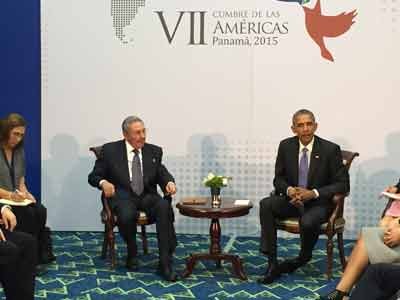(NNPA) — I was standing in the Jacksonville, Florida Airport waiting for a flight home when I looked up at the television at the gate. CNN was repeating the story that President Obama and Cuba’s President Raul Castro were to have a one-on-one discussion and were also to speak to the press. This was a sight that, until a few months ago, I had never expected.
The change in United States/ Cuba relations has been a long time coming. The United States has attempted through a combination of a blockade, assassinations, invasions and support of terrorism, to undermine and overthrow the Cuban government. Though it has succeeded in creating great misery for the Cuban people, it never shattered their reserve. In effect, the Cubans stood firm.
At the same time, the U.S. took on more and more the appearance of, not only a global bully, but also a global brat. It has had to have its way at whatever cost. The problem is that its belligerence towards Cuba continued to backfire, leading to a situation of increasing isolation. As the April 2015 “Summit of the Americas” approached, the isolation of the U.S. and Cuba became very evident, necessitating that something change.
President Obama, despite protests from many domestic right-wingers, recognized that the jig was up and that the USA/Cuba relationship needed to alter. Undoubtedly, what the U.S. now hopes to accomplish is to subvert Cuba through various economic incentives. Only time will tell whether such an approach will work. What is clear, however, is that the Cuban government, while looking forward to an improvement in relations, is not planning on getting on its knees for the United States.
Ironically, at the same time that U.S./Cuba relations were improving, the U.S./Venezuela relationship had worsened. The U.S. announced that Venezuela represents an alleged security threat. Most of the Western Hemisphere has rejected this characterization, and the approach of the U.S. toward Venezuela, apparently forcing the Obama administration to reconsider its stand towards Venezuela.
The ruling elite in the U.S. seems to have great difficulty appreciating that Latin America is not its property. There really is something called “national sovereignty” that nations on this planet are supposed to respect. Yet, when it comes to Latin America there is a long history— dating back to the Monroe Doctrine of the 19th Century— of assuming that the entire hemisphere is made up of different components of Washington, D.C.’s realm.
Upon looking at President Castro on CNN the other day, it was clear that he has different ideas.
Bill Fletcher, Jr. is the host of The Global African on Telesur-English. He is a racial justice, labor and global justice writer and activist. Follow him on Twitter, Facebook and at www.billfletcherjr.com.
